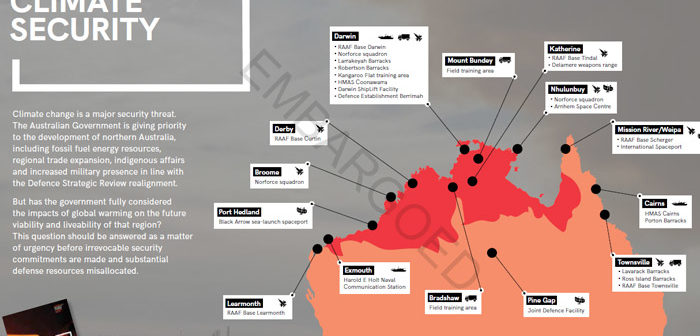
Analysis released by the Australian Security Leaders Climate Group (ASLCG) accuses the Albanese government of dropping the ball on climate change and not adequately addressing climate security risks.
The group, comprising former senior defence and security leaders, released its new report, Too Hot to Handle: The Scorching Reality of Australia’s Climate–Security Failure, on May 2, 2024.
The report says the government is refusing to give the impacts of climate change on security any serious attention, particularly regarding how increasing food and water insecurity will profoundly change the global security landscape and drive regional conflict.
It says the Office of National Assessment (ONI) gave the government detailed advice on the climate threats in late 2022. However, the government has refused to release a declassified version of the ONI climate and security risk assessment or inform the public about its key findings. The ASLCG adds that the recently released National Defence Strategy almost wholly ignored climate change, saying that it had allocated an additional AUD18 billion for bases in northern Australia with no acknowledgment that, in a rapidly warming climate, parts of northern Australia will be so hot and humid for much of the year as to become practically unliveable.
“This is just one example of climate being missing in action in security analysis,” said former ADF Chief and ASLCG member Chris Barrie. “ASLCG agrees with the wide range of global political and security leaders who say that climate is now the greatest threat to human civilisation, not least as shown in recent analysis by the World Economic Forum. Even the US Defence Secretary describes climate as an ‘existential’ risk.”
Barrie says one of the greatest disruptive physical climate risks concerning scientists is the collapse of the Atlantic Meridional Overturning Circulation, which could occur by mid-century. “It could wipe out much of agricultural production in the UK, Ireland and Scandinavia, with ramifications which would significantly affect the Antarctic and Australia,” said Barrie. “I doubt whether the EU or NATO would survive such pressure, but in the two years of this parliament, not a single member of the government or the opposition has uttered a word about this severe climate-security risk.”

ASLCG proposes that the government should urgently develop a genuinely integrated National Climate-Security Strategy to address these rapidly changing circumstances, which would:
- Establish a climate threat intelligence unit with outputs including an annual, declassified briefing to parliament.
- Establish an abrupt climate change early warning system.
- Legislate a Global Catastrophic Risk Management Act.
- Release a declassified version of the ONI climate risk assessment report.
“It appears that the government either doesn’t understand what our scientists are telling them, or they are deliberately hiding the facts from the Australian community, ” said Barrie.
You can read the full report here.






